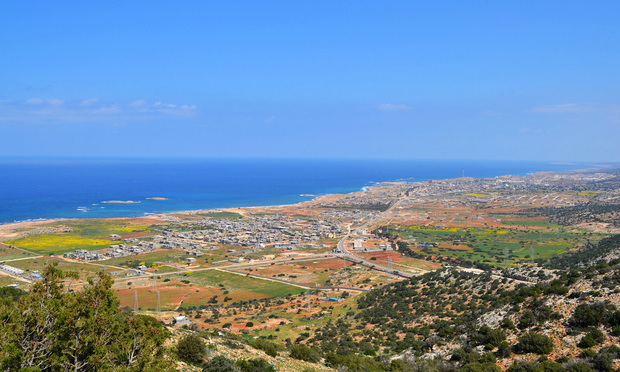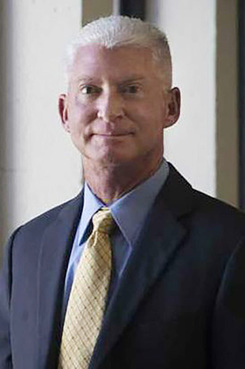Crisis Firm's $1.5B Port Project Aims to Heighten US Investment in Africa
The Texas businessman behind the project, Michael Guidry, says the port represents an opportunity for the U.S. to establish a significant presence in North Africa, which has 1,100 miles of coastline, before the Chinese stake a claim.
February 20, 2019 at 03:31 PM
5 minute read
 Port of Susah site in North Africa.
Port of Susah site in North Africa.
Texas businessman Michael Guidry says he has a $1.5 billion plan to help the U.S. gain a strategic foothold in Africa, which he says is being overrun with investors from other countries, primarily China.
For the past three years, Guidry has been laying the groundwork for what he envisions as North Africa's “most highly-automated and largest deep sea port.” He wants to build the port on the coast of the Mediterranean Sea near the town of Susah in oil-rich Libya. But first he needs investors.
 Michael Guidry.
Michael Guidry.Guidry is the founder and CEO of security services and investment firm the Guidry Group, which is increasing its focus on developing infrastructure and has been “a global leader for kidnap and ransom resolution, security services, and crisis response/management,” according to its website.
In late January, Libyan government authorities gave the Guidry Group approval to move forward with the port deal. At the time, Hassan Jwaili, a seaport chairman of Eastern Libya, said in a prepared statement that the port was “projected to generate tens of millions of dollars in its first year alone.”
Guidry said in an interview Tuesday that he was in the midst of discussions with two potential U.S. and European investors, but declined to provide additional details, citing a nondisclosure agreement.
For Guidry, the Port of Susah project represents an opportunity for the U.S. to establish a significant presence in North Africa, which has 1,100 miles of coastline, before the Chinese stake a claim.
China has built ports, roads, railroads and other infrastructure throughout Africa and is already the continent's biggest trading partner.
“China has always been looking at places for foreign investment. They're looking all around the world. Africa has been a prime target for Chinese for mineral access,” said Adams Lee, an international trade lawyer at Harris Bricken in Seattle who represents American and Chinese companies. “A port project seems like it would be an interesting target for Chinese heavy industrial development.”
In 2017, there were more than 10,000 Chinese-owned firms operating in Africa, primarily in the southern regions, according to a report from global management and consulting firm McKinsey & Company. The study also found that Africa-China trade had been growing by about 20 percent per year.
“All I see every time I go to Africa are more and more Chinese,” Guidry said. “It's the richest continent in the world. It has minerals, oil, gas … anything you can think of. The Chinese see Africa as the gem of the world and have been moving into it for probably the past 20 years. They pretty much have a stronghold in just about every country in Africa.”
Except Libya, according to Guidry. He said, “If we lose Libya then we've lost almost all of North Africa. We've already lost South Africa.”
Assuming he can secure the necessary investors, Guidry hopes to break ground on the Port of Susah in October, which he said will be the “biggest infrastructure project Libya has ever had.” He dismissed concerns about possible government corruption or security threats, though he acknowledged that Libya's capital, Tripoli, where militias have been fighting for control of the city, is “the only negative side” of the country.
Libya remains on the U.S. Office of Foreign Assets and Control's list of sanctioned countries. And the U.S. State Department has warned residents to avoid traveling to Libya due to “crime, terrorism, civil unrest, and armed conflict.”
“Any U.S. interest would have to be careful about who they're dealing with and how they're interacting with Libya,” said Lee, the international trade lawyer in Seattle. “They don't want to cross those tripwires that sanctions have set up.”
He added the U.S. is “facing global competition more and more from the Chinese. And so I think this project sounds interesting, but because of where it's located and the type of project it is there will be all sorts of complications.”
Read More:
Is Africa Still the Next Big Thing for Global Law Firms?
This content has been archived. It is available through our partners, LexisNexis® and Bloomberg Law.
To view this content, please continue to their sites.
Not a Lexis Subscriber?
Subscribe Now
Not a Bloomberg Law Subscriber?
Subscribe Now
NOT FOR REPRINT
© 2025 ALM Global, LLC, All Rights Reserved. Request academic re-use from www.copyright.com. All other uses, submit a request to [email protected]. For more information visit Asset & Logo Licensing.
You Might Like
View All
Advance Auto Parts Hires GC Who Climbed From Bottom to Top of Lowe's Legal Department
2 minute read
Compliance With EU AI Act Lags Behind as First Provisions Take Effect

State AG Hammers Homebuilder That Put $2,000-Per-Day Non-Disparagement Penalty in Buyer Contracts
3 minute read
NBA Players Association Finds Its New GC in Warriors Front Office
Trending Stories
- 1Morgan Lewis Adds 4 IP Partners in Orange County, 1 in Seattle
- 2Delaware DOJ's Hume Is Named Newest Magistrate In Chancery
- 3Trade Wars: Five Tips for Legal Teams to Manage Tariffs and Trade in Trump II
- 4Balancing Attorney-Client Privilege With a Lawyer’s Right to Defend Against Allegations of Wrongdoing
- 5Public Interest Calendar of Events
Who Got The Work
J. Brugh Lower of Gibbons has entered an appearance for industrial equipment supplier Devco Corporation in a pending trademark infringement lawsuit. The suit, accusing the defendant of selling knock-off Graco products, was filed Dec. 18 in New Jersey District Court by Rivkin Radler on behalf of Graco Inc. and Graco Minnesota. The case, assigned to U.S. District Judge Zahid N. Quraishi, is 3:24-cv-11294, Graco Inc. et al v. Devco Corporation.
Who Got The Work
Rebecca Maller-Stein and Kent A. Yalowitz of Arnold & Porter Kaye Scholer have entered their appearances for Hanaco Venture Capital and its executives, Lior Prosor and David Frankel, in a pending securities lawsuit. The action, filed on Dec. 24 in New York Southern District Court by Zell, Aron & Co. on behalf of Goldeneye Advisors, accuses the defendants of negligently and fraudulently managing the plaintiff's $1 million investment. The case, assigned to U.S. District Judge Vernon S. Broderick, is 1:24-cv-09918, Goldeneye Advisors, LLC v. Hanaco Venture Capital, Ltd. et al.
Who Got The Work
Attorneys from A&O Shearman has stepped in as defense counsel for Toronto-Dominion Bank and other defendants in a pending securities class action. The suit, filed Dec. 11 in New York Southern District Court by Bleichmar Fonti & Auld, accuses the defendants of concealing the bank's 'pervasive' deficiencies in regards to its compliance with the Bank Secrecy Act and the quality of its anti-money laundering controls. The case, assigned to U.S. District Judge Arun Subramanian, is 1:24-cv-09445, Gonzalez v. The Toronto-Dominion Bank et al.
Who Got The Work
Crown Castle International, a Pennsylvania company providing shared communications infrastructure, has turned to Luke D. Wolf of Gordon Rees Scully Mansukhani to fend off a pending breach-of-contract lawsuit. The court action, filed Nov. 25 in Michigan Eastern District Court by Hooper Hathaway PC on behalf of The Town Residences LLC, accuses Crown Castle of failing to transfer approximately $30,000 in utility payments from T-Mobile in breach of a roof-top lease and assignment agreement. The case, assigned to U.S. District Judge Susan K. Declercq, is 2:24-cv-13131, The Town Residences LLC v. T-Mobile US, Inc. et al.
Who Got The Work
Wilfred P. Coronato and Daniel M. Schwartz of McCarter & English have stepped in as defense counsel to Electrolux Home Products Inc. in a pending product liability lawsuit. The court action, filed Nov. 26 in New York Eastern District Court by Poulos Lopiccolo PC and Nagel Rice LLP on behalf of David Stern, alleges that the defendant's refrigerators’ drawers and shelving repeatedly break and fall apart within months after purchase. The case, assigned to U.S. District Judge Joan M. Azrack, is 2:24-cv-08204, Stern v. Electrolux Home Products, Inc.
Featured Firms
Law Offices of Gary Martin Hays & Associates, P.C.
(470) 294-1674
Law Offices of Mark E. Salomone
(857) 444-6468
Smith & Hassler
(713) 739-1250






